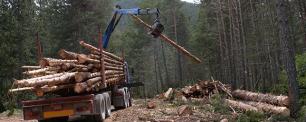Agriculture and forestry increase the production world ecosystem biomass by 15%
CREAF has participated in an international study which has estimated the total biomass production of all planetary ecosystems. These data can be used to improve accounting of the global supply of natural resources and plan strategies for boosting the sequestration of atmospheric carbon.
A study published today in Nature Geoscience has shown that human activities improve the productivity of ecosystems worldwide. According to Josep Peñuelas, CSIC researcher and director of the the Global Ecology Unit at CREAF, managed ecosystems transform 60% of the carbon assimilated in photosynthesis into biomass, while natural systems fix only 45%.
The researchers confirmed this fact in the six main planetary ecosystem types (forests, pastures, crops, tundra, boreal peatlands and wetlands).
"On the global scale, and independent of climate and vegetation, all of the ecosystems managed by humans create biomass more efficiently,” says Josep Peñuelas.
“Over history, we humans have made a large effort to provide a maximum amount of resources to plants so as to increase their productivity in terms of wood, fiber, or food. With this study we have quantified the result of this historical management for ecosystems worldwide,” says Josep Peñuelas. Examples of this kind of human management are pasture fertilization, which increases the stock of nutrients within the ecosystem, or forest thinning, which increases the amount of nutrients available to each individual tree by reducing competition.
Our wellbeing rests on ecosystem productivity
This study will aid future projections and political decisions aimed at maintaining production of biomass, food, wood, and natural fibers that will be required as a response to accelerating growth of the world’s population. It will also improve quantification of the amount of carbon that ecosystems are able to sequester, and the design of management strategies for reducing the quantity of atmospheric CO2.
Article:
M. Campioli, S. Vicca, S. Luyssaert, J. Bilcke, E. Ceschia, F. S. Chapin III, P. Ciais, M. Fernández-Martínez, Y. Malhi, M. Obersteiner, D. Olefeldt, D. Papale, S. L. Piao, J. Peñuelas, P. F. Sullivan, X.Wang, T. Zenone and I. A. Janssens. Biomass production efficiency controlled by management in temperate and boreal ecosystems. Nature Geoscience. Doi: 10.1038/ngeo2553
Autora: Marina Torres Gibert






